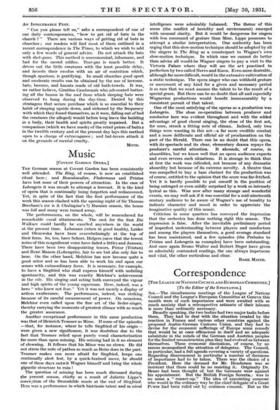Music
[COVENT GARDEN Orrate.] THE German season at Covent Garden has been consistently well attended. The Ring, of course, is now an established ritual here ; and Rosenkavalier, Fledermaus and Tristan have lost none of their powers of attraction. In the case of Lohengrin it was unsafe to attempt a forecast. It is the kind of opera that is continually being forgotten and rediscovered.
Yet, in spite of the fact that the first performance of the work this season clashed with the opening night of Sir Thomas Beecham's (or is it Chaliapine's ?) Russian season, the house was full and many were turned away.
The performances, on the whole, will be remembered for remarkable vocal attainments. The cast for the first Die Walkure could hardly be excelled anywhere in the world at the present time. Lehmann (when in good health), Leider and Olczewska have been overwhelmingly at the top of their form. So, too, have Schorr, Helgers (save that the lowest notes of this magnificent voice have faded a little) and Janssen. There have been two disappointing tenors, Pistor (Tristan) and Rene Maison (Lohengrin), fair to see but also only fair to hear. On the other hand, Melchior has now become quite a. good actor and so has been able to work his end upon our senses with extraordinary force. It is necessary, for example, to have a Siegfried who shall express himself with unfailing spontaneity, and this was exactly Melchior's achievement in the r6le. His singing and acting both conveyed the vigour and high spirits of the young superman. Here, indeed, was a hero " who knew not fear." Yet it was not merely a display of artless exuberance. The performance, indeed, was Striking because of its careful measurement of power. On occasions, Melchior even called upon the- flne• art of the lieder-singer, thereby carrying the moments of greatest climax with so much the greater assurance.
Another exceptional performance in this same production was that of Heinrich Tessmer as Mime. If some of the episodes —that, for instance, where he tells Siegfried of his- origin— were given a new significance, it was doubtless due to the fact that Tessiner relied upon purely vocal characterization far more than upon miming. His miming had in it no element of clowning. It follows that his Mime was no clown. He did not stress the note of pathos as much as Reiss does in the part. Tessmer makes one more afraid for Siegfried, keeps one continually alert lest, by a quick-brained move, he should one of these days outwit Wagner himself and bring the whole gigantic structure to ruin !
The question of miming has been much discussed during the present season, chiefly as a result of Juliette Lippe's conce2tion of the Brunnhilde music at the end of Siegfried. Hers was a performance in- which histrionic talent and m zsical intelligence were admirably balanced. The theme of this scene (the conflict of heredity and environment) emerged with unusual clarity. But it would be dangerous for singers with less command of gesture than Mme. Lippe possesses to attempt a similar interpretation. One authority has been urging that this slow-motion technique should be adopted by all the singers in The Ring as a counterpart to Wagner's own slow-motion technique. In which case we cannot do better than advise all would-be Wagner singers to pay a visit to the Victoria Palace where they will see the art practised to perfection by two called Nervo and Knox. Even more desirable, although far more difficult, would be the extensive cultivation of a static technique. The opera singer who can withhold gesture or movement of any kind for a given and necessary period is so rare that we must assume the talent to be the result of a special grace. But there can be no doubt that all and especially Wagnerian productions would benefit immeasurably by a consistent pursuit of that talent.
One of the most satisfying of the operas as a production was Lohengrin. The close co-operation between producer and conductor here was evident throughout and with the added advantage of good choral singing, the close of the first act, for once, struck a fitting note of climax. Indeed, only two things were wanting in this act—a fax more credible combat and a more deliberate and official air of proclamation .on the part of the Herald. There can be no doubt that this opera, with its spectacle and its clear, elementary drama repays the producer's careful attention. It abounds; of course, in absurdities, but we know well that an opera audience expects and even reveres such situations. It is strange to think that at first the work was ridiculed, not because of any dramatic absurdity but because of its extreme novelty. A theatre that was compelled to buy a bass clarinet for the production was of course, entitled to the opinion that the score was far-fetched. Yet it is hardly possible to put oneself in the position of being outraged or even mildly surprised by a work so intensely lyrical as this. Wise now after many strange and wonderful events, we may well ask if it was essential for a mid-nineteenth century audience to be aware of Wagner's use of tonality to indicate character and mood in order to appreciate the imaginative quality of this music. - Criticism in some quarters has conveyed the- impression that the orchestra • has done nothing right this season. The impreSsion is false. After the inevitable preliminary period of imperfect understanding between players and conductors and among the players themselves, a good average standard has been maintained, and a few_ episodes (the Preludes to Tristan and Lohengrin as examples) have been outstanding. And once again Bruno Walter and Robert Heger have given us admirably contrasted readings, the one alviays impetuous and vital, the -other meticulous and clear.
BASIL MAINE.






































 Previous page
Previous page